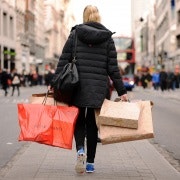Retailers' big data balancing act
Retailers are finally getting a leg-up on online shopping, embracing big data to give them more intel on customers who shop in their stores. While on the one hand new technology is levelling the playing field, on the other, the solutions are fairly terrifying.
Wi-Fi company Ruckus has launched a new technology called Spot which tracks customers’ activity via their smartphones as they shop around. Spot works by identifying your mobile phone’s unique identifying code (known as a MAC address) as you log into the free Wi-Fi it provides at shopping malls. It then uses the code to track where you’re shopping and how long you’re lingering over those amazing headphones. Ruckus already has 12 clients signed up, one of which is Australian.
Ruckus’ regional manager Chris Evans assures Business Spectator the Spot system is completely secure. “All it’s doing is taking the beacons from each phone using its MAC address,” he says. “But before it goes to our clients that code becomes hashed – anonymous – which means our client get its stack data without any individual identifying data.”
Anonymity goes out the window however if customers download the shopping mall’s official app, where its terms of service will include permission to both track and identify you. It’s then that retailers can start to form a customer profile based on your activity, much the same way that Amazon or Google do when you shop online.
The potential for retailers to leverage such technology through, for example, incorporating it with customer loyalty programs is huge. “If we think about bricks and mortar retailers that are out there struggling against online retailers, it’s giving physical stores the ability to have additional information on its customers.”
Meanwhile, shopping malls such as Westfield (not one of Evans’ clients) will be able to measure where their most popular stores are and charge accordingly for shop rental or placement of advertisements around the mall.
“So when a store like Top Shop or H&M enters the Australian market and they say ‘we want the best spot in your mall’, they’ve got evidence for it and can charge accordingly,” Evans says.
However, obviously there are some cautionary measures which businesses must take in order for the data to be effective. First, retailers must understand they’re not going to be able to capture 100 per cent of the market. Approximately 70 per cent of retail customers log into free Wi-Fi given the opportunity, according to Evans. Second, they need to be smart in how they use – and store – information.
“If one of your customers starts visiting baby shops, do you then send them message congratulating them on the good news, saying ‘I understand you’re pregnant’? Obviously, no. Retailers need to be careful with information at hand. Follow the Google path: let’s not be evil about it.”
People also aren’t always honest with the information they disclose, which can potentially create extra pitfalls. For instance, companies who advertise on the mall’s app may have no way of knowing if they are spruiking to minors. “It’s very easy for someone to say they’re over 18,” Evans says. “These things need to be carefully considered if you’re using this technology for marketing.”
Ruckus next plans to use Spot in the hospitality space, where it could potentially be used to track how long guests use facilities such as restaurants and bars. “If they’re not hanging around in the hotel you could give them some kind of offer to get them to spend more time in-house,” Evans suggests. The service could also help hotels keep down costs by monitoring vacancies. For instance, appliances could be switched off as soon as a guest leaves, while guests' room preferences could be reset.
While the potential for retailers and other businesses to leverage such technology for commercial benefit is enormous, it’s clear they must find a balance between this and respecting customers’ desires. What do you feel about this technology? Do you want to be monitored when you shop? Have your say below.
Claire Porter attended the Tech Leaders’ Forum in Queensland as a guest of Media Connect.













